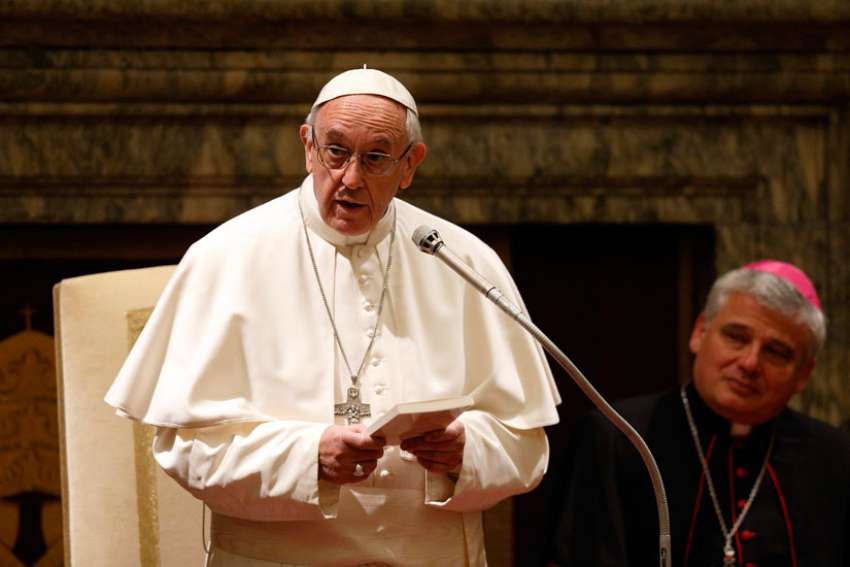Francis opened his annual Dec. 22 speech reflecting on how God humbled himself, making himself small and becoming a servant to mankind.
“At Christmas we are called to say ‘yes’ with our faith, not to the master of the universe, and not even to the most noble ideas, but precisely to this God who is the humble lover,” he said.
With this “gentle and impressive” image of the Christ child in mind, the Pope delved into his reflections on the curial reform, touching not only on the functions of the curial offices, but also the importance of a constant personal conversion and the different types of resistance – both good and bad – that inevitably pop up during processes of change.
“Since the Curia not an immobile bureaucratic apparatus, the reform is above all a sign of the vivacity of the Pilgrim Church, of a Church that is living and because of this ‘semper riformanda,’ in need of reform because she is alive,” he said.
Francis stressed that the reform isn’t “an end in itself,” but rather “a process of growth and above all conversion.”
The reform doesn’t have “an aesthetic end” directed at making the Curia seem more beautiful in appearance, like “a facelift” or slabbing makeup onto an “old curial body” in order to hide the wrinkles, he said, adding that “it’s not the wrinkles of the Church that must be feared, but the blemishes!”
Merely changing up the staff – which is necessary and bound to happen – isn’t enough, he said, stressing that only “the conversion of people” will make the reform bear fruit, because “without a change of mentality the functional efforts would be in vain.”
Pope Francis said the reform must first of all “con-form to the Good News which must be joyfully and courageously proclaimed to all, especially to the poor, the least and the discarded.” It must also “con-form to the signs of our times” in order to better meet the needs of the men and women of today.
At the same time, it involves making the Curia more “con-formed” with its primary goal, which is collaborating in “the specific mission of the Successor of Peter, therefore supporting the Roman Pontiff in the exercise of his singular, ordinary, full, supreme, immediate and universal authority.”
He highlighted three types of resistance that can appear, saying such a phenomenon is “normal (and) even healthy” in terms of helping the process move forward.
The first type of resistance, he said, is “open resistance,” which often arises “from good will and sincere dialogue.” However, he said there is also a “hidden resistance” that comes from “fearful or petrified hearts content with the empty rhetoric of a complacent spiritual reform.”
These are the people “who verbally say they are ready for change, but want everything to stay as it was before,” the Pope observed.
A third type of resistance he mentioned was “malicious resistance, which often sprouts in misguided minds and appears when the devil inspires bad intentions.”
This type of resistance, Francis said, frequently “hides behind words of self-justification and often accusation; it takes refuge in traditions, appearances, formalities, in the familiar, or else in a desire to make everything personal, failing to distinguish between the act, the actor and the action.”
An absence of a reaction “is the sign of death,” he said, and because of this “good resistances – and even those not as good – are necessary and merit being listened to, welcomed and encouraged to express themselves.”
“The reform of the Curia is a delicate process that must be lived with fidelity to the essential, with continuous discernment, with evangelical courage, with ecclesial wisdom, with attentive listening, with tenacious action, with positive silence, with firm decisions, with a lot of prayer, with deep humility, with clear farsightedness, with concrete steps forward,” he said.
At times, when necessary, there will also be steps backward, the Pope said, but insisted that the reform must continue to move forward “with a determined will, with vibrant vitality, with responsible authority, with unconditional obedience.”
Pope Francis then highlighted 12 “guiding principles” which he said form the heart of his vision for the ongoing Curial reform: individuality (personal conversion); pastoral concern (pastoral conversion); missionary spirit (Christocentrism); rationality/clear organization; functionality; modernization (updating); sobriety; subsidiarity; synodality; catholicity; professionalism and gradualism (discernment).
After reflecting briefly on each of the 12 points, the Pope outlined nearly 20 steps that have already been made in the reform, from the formation of the Council of Cardinals in 2013, to the 2015 streamlining of the marriage annulment process, to the establishment of two new mega-departments, also called dicasteries, which merged several other offices together earlier this year.
He closed his speech noting that the meeting began by reflecting on the meaning of Christmas “as the overturning of our human criteria, in order to emphasize that the heart and center of the reform is Christ (Christocentrism).”
Francis closed by reiterating that Christmas “is the feast of God’s loving humility,” and recited a prayer written by Father Matta el Meskin, a contemporary monk, on the smallness and humility of Jesus born in Bethlehem.
After, he gave each of the Curia members a copy of a book written by the third Superior General of the Jesuits, Fr. Claudio Acquaviva S.J., called “Accorgimenti: per curare le mattatie dell’anima,” meaning “Precautions: to cure diseases of the soul.”
(Story from the Catholic News Agency)


